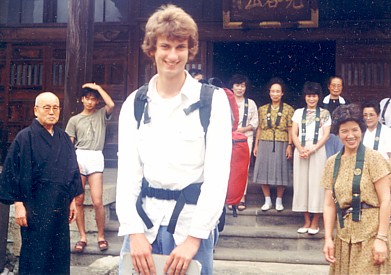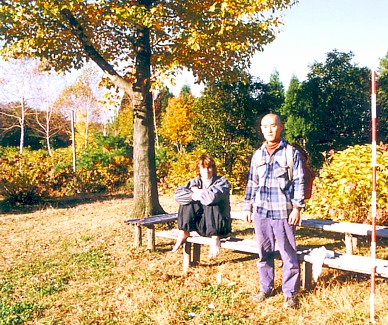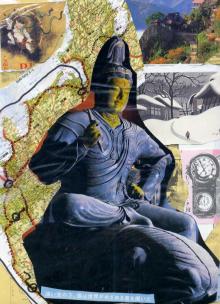|
|---|
Twelve Years Since Aum (Part 12 & 13)  With 19, hitchhiking from a temple in Utsunomiya towards Kyoto. |
When I encountered zazen at age 16, it was like a first discovery of my physical existence. I realized that I not only have a body, but rather that this body is me. There were around 15 members in the Zen circle that I participated in. We were sitting in the evening, maybe two or three times a week. After the sitting, the teacher would ask us: "How was it? Did you feel something?" Often he was referring to a spot he would call "the Centre", and say that the goal of zazen was to return to this "Centre. He would ask each of us: "Did you find your Centre? What did you fell there?" To my surprise, no-one seemed to have difficulties with this. One girl saw herself walking through a beautiful meadow with flowers in her "Centre", while a boy felt that a golden pendulum was swinging in his "Centre". I was the only one who repeated each time: "Sorry, I haven't found that 'Centre' yet. Maybe next time. Could you explain once more what you mean and where to find it? Is it the navel or what?" The only thing that I felt was the physical perception of my body. Nothing extra-ordinary, but at the time this discovery of my physical existence was enough to bring me back to zazen each time. One year passed, and one day the teacher came to my room to visit. "I will leave the school soon. I am only worried about the zazen circle. Could you please take responsibility for it?" It was a Christian school and obviously it hadn't been easy for him to gain the understanding of the other teachers at the school. What surprised me more than his decision to leave though, was that he asked me to continue as the "leader" of the group. That of course didn't mean much more than preparing the room before the sitting, measuring the time etc, but still, I was the only one in the group who had never had any experience of a "Centre" or anything. I would just come each time and just sit. The experience of myself - this body - just sitting was enough to keep me coming back eachtime. And now, in retrospect that seems to be exactly the reason why this teacher had decided that zazen was the right thing for me, and I the right person for zazen. Still, I had no idea what Zen was all about in the first place. I hadn' been concerned too much about this question until then, but when I was put in charge of the zazen circle, I felt that I should study some books about Zen. At the time, there weren't too many books out in German about Zen. Maybe the most famous was Herrigel's "Zen and the art of archery", and then the books by D.T. Suzuki of course. Through these books I learned about "satori" for the first time, and I was sure that it must have been this "satori" that I had been looking for all the time. The answer to everything! The meaning of life, the real myself... I thought I'd understand everything once I got a grisp on this "satori" - the answer to all questions. So until I started to read books, sitting alone had been enough. After a couple of months, I already felt somehow that this was the only thing in my life that I wanted to continue for years to come. Everything else that interested me at the time, mathematics, physics, computers, games, was only "interesting", it wasn't my life. But after I learned about "satori", the feeling that I found my destination in life turned into conviction. On the other hand, sitting alone didn't seem enough anymore. What use was there in just sitting without satori, I would think to myself. Wasn't zazen just a means to an end, after all? I had wasted a year just sitting in the posture, now it was time to get really serious and find a teacher that would guide me to enlightenment! It was around that time that I shaved my head for the first time. I was sure that I wanted to become a Zen monk, I just didn't know how. I found a Christian-Zen teacher in the Yasutani tradition, but when she asked me if I wanted to become her student, I hesitated. After all, she was Christian, and she wasn't Japanese either, so could she really be enlightened? I wanted to wait until I get out of highschool and go to Japan, to find a "real" teacher, Japanese and everything. Everyone seemed to try to talk me out of it, but no-one could convince me, until the teacher who had originally introduced me to zazen also said: "No, you should first go to university and study, so that you can get a job after you get back from Japan." Why would I need a job? I wasn't even sure if I would ever get back from Japan. But I agreed that it would be best to study Japanese before going to Japan, so I took up Japanese studies, philosophy and physics at the university. At the time everyone seemed to believe that Far Eastern religions and elementary particle physics were somehow related, so I thought that I would not only become an enlightend Zen master, but also would win the Noble price for finding some kind of unified theory in physics, that explains all the riddles of the universe... In retrospect, I was probably agood idea not to become a Zen monk at age 19, when I had no knowledge of Japanese, had never read Dogen Zenji and had no idea to which monastery I should go. I had no idea how degenerated Japanese Zen is. I thought that I would find Zen anywhere in Japan. My host family though was Catholic. Just as I hoped to learn about Zen from any Japanese, they hoped to find out more about Christianity from a "real European". They would take me to church on sunday for example, and ask me: "Is everything we are doing here alright? Is it the same as you do it in Germany? Or is anything wrong?" I am sure there was nothing wrong, I just wasn't interested in going to church in Japan when I wanted to learn about Zen. But when I told them that I wanted to see Buddhist temples and practice zazen, they would say: "Forget about Zen, that's a waste of time! Western Christianity is far superior." And when I told them that I wanted to listen to Japanese shakuhachi and koto music, thinking that that was "Zen" somehow too, my host finally lost his temper, put on a record by Beethoven and shouted: "Listen to this son! This is real music!" Both sides were disappointed. But not only my host seemed to be indiffferent towards Zen. None of the young Japanese that I talked to had ever practiced zazen themselves, and few knew what it was about. I found that strange: "Isn't Japan the country of Zen? Isn't this the countruy where all the real Zen masters and the books on Zen come from?" At the time I couldn't understand why the Japanese were so indifferent towards Buddhism, but today I do not find it so surprising. Japanese Buddhism is just as degenerated as Christianity, maybe even worse. But a Western teenager doesn't know that. I only had ideals in my head, a romantic picture of Zen that I had up in my head. The Japanese public on the other hand sees the sad reality of Buddhism every day: Lazy priests that are hungry for money and weary of practice. Tempels that are inherited from father to son and run as businesses. I didn't feel like consulting a Christian priest in Germany myself, no wonder the young Japanese wouldn't visit Buddhist temples to discuss the problems of life and death with the priests or look for spiritual guidance of some kind. Today, when you search at www.yahoo.com for "zazen", you'll find a Wikipedia article, instructions on the posture and it's relationship to enlightenment - just as you would expect. If you do the same search on Japanese Yahoo though, www.yahoo.co.jp, you find almost twenty entries on a Japanese funk band (www.mukaishutoku.com/main.html ) and one site with anime pictures (dr6.xxxxxxxx.jp), nothing about zazen itself. In present day Japan, "zazen" is a label that you put on music and art work to make it sound outlandish, not something you'd practice. Nor is it something that the Japanese would relate to as part of their culture, quite contrary to what some books try to make you believe. That young Japanese are indifferent towards zazen doesn't mean though that they were not questioning their lifes. Just as in the West, many of them look for alternatives to the way of life in modern society, or are just asking themselves: "Who am I?" If I had been born as a Japanese, I'd probably never gained interest in Buddhism. Although Aum never appealed to me as a religion, I might have ended up in some cult, or maye just lived a desperate, lonely live closed up in my own, private world. And that is exactly what is happening to many Japanese. The point I am trying to make is that this wouldn't happen if Japanese Buddhist priests were actually preaching and practicing Buddhism. Many Japanese kids just live in their heads, they - just like myself as a teenager - have no relation to their bodies, except maybe their thumbs, that they use to play with their cell phones and games. They simply don't know what to do with themselves and their lives. Some of them ended up in cults like Aum, that attracted people through Yoga courses and taught them that their consciousness could be changed by doing physical excercises. This in itself is nothing surprising. Both Buddhist practice and Yoga are based on the untiy of body and mind. Japanese people today are just as unaware of their bodies as in West. No-one teaches the importance of the body - not inside the family, not at school, and of course not in temples. Even at Komazawa University, a Soto Zen institution, many students join cults, which is one of the many problems that are discussed inside Sotoshu these days: Temple sons ending up as followers of missionizing cults while studying Buddhism at Komazawa University! But then, would you expect them to look up to their fathers as their Buddhist teachers, when those fathers have nothing on their minds than restoring the temple buildings, and buying a bigger car perhaps. The experiences I made after entering university, going to Japan for a second time at age 22, and finally ordaining as a monk in Antaiji, can be found in "adult practice" parts VII, VIII and IX. Next month, I'd like to investigate what the reasons are for Japanese Buddhisms downfall: When and why did Japanese priests stop practicing what they preach, and when did they stop preaching altogether?
(to be continued ... Docho)
|
|---|
 With 22, my first time at Antaiji. Under the still small Hananoki tree with senior monk Eiryu. |
 Landscape of south Mexico. To where we are heading????  My question, what is LIFE??? |
I like traveling, and have traveled a lot but always with the eternal question in my mind gWhat is life?h I wanted an answer. One day I visited a friend who studies anthropology and archaeology. He knew an archaeological site project in Veracruz Mexico. I spent ten days with the project and then had to leave for an interview for a job I applied for, and I needed money at the time. I traveled up north headed to Aguascalientes (which means gHot springsh) to take up a job in a factory that produces Japanese cars. The bus took me from the wet coast to dry highland and watching the view through the window, the landscape changing from one extreme to the other and then the highest peak in Mexico, was quite amazing. On the bus I met a Mexican female who seemed about 40 years old. She sat down in the seat next to me. She started to talk about Zazen. She insisted that gHow nice Zazen is!h I couldnft respond to anything she was telling me about so I just listened. After one year I left the manufacturing company in Mexico and I decided to take another job, because it was a good offer. After a short time I decided to go back to Japan. After returning I spent another year, holding her story, and my motivation to learn Zazen, but I couldnft find an adequate teacher. At that time I was living on the pacific coast in northeast Japan. One of my friends invited me to an ethnic concert where I met a monk who was one of the performers. He sang with a low voice and I had the opportunity to ask him about Zazen. He invited me to a Soto Zen temple in Fukushima. I was lucky to have this personal one-on-one teaching, and he taught me the manners very carefully. I listened and had many questions, for example gWhy do we do always turn clockwise?h and gWhy do we do so many times Gassho (bowing). My first impression of Zazen was of getting transparent. Also I realized that I had been looking for something outside of myself. However, I couldnft break my prejudice towards religions. My generation is especially influenced by cultic groups. I didnft want to talk about religions. And one of my Christian friends would say, gIf you hate Buddhist monks, you would hate the Okesa too.h To tell the truth, I was not so interested in traditional Buddhism. But I was seeking for something religious. And when I was in Latin America, I experimented working at an orphanage of the Catholic Church and I used to visit the desert cathedrals at midday to listen to the silence, and I attended the talks of the pastor at a Protestant Church. But I couldnft totally believe in Christianity. I have been moved by religious people who pray - hands making the cross - in church, or bows (Gassho) in front of a Buddha statue. After meeting and learning from my first teacher, I moved to Nagoya where I grew up. I continued to sit Zazen by myself, and felt appreciation for all those encounters and opportunities. (Gassho)
Yohei Araki
|
|---|
